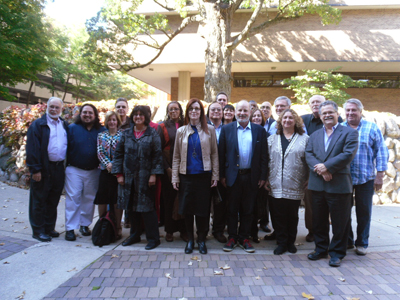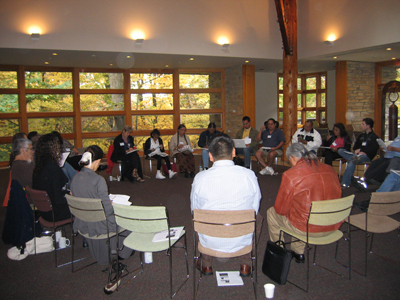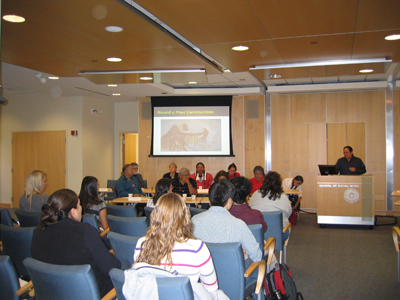The following conferences, or “sites of dialogue,” were organized and led by Dr. Gone and colleagues at the University of Michigan.
“Reconciling Evidence-Based Practice & Cultural Competence in Mental Health Services” Conference
(October 2011)
 The call for professional adoption of Evidence-Based Practice (EBP) and “empirically supported” treatments in mental health services is premised on the commitment to a scientifically-grounded clinical practice that promises access to the most effective services for the greatest number of those in need.
The call for professional adoption of Evidence-Based Practice (EBP) and “empirically supported” treatments in mental health services is premised on the commitment to a scientifically-grounded clinical practice that promises access to the most effective services for the greatest number of those in need.
In juxtaposition to the EBP movement in the mental health professions, however, multiculturalist advocates have observed that mainstream mental health practices have typically originated out of the life experiences of Europeans and Euro-Americans, and therefore harbor the potential for alienation, assimilation, or other associated harms for culturally distinctive ethnoracial minority populations. As a consequence, practitioners are urged to provide Culturally Competent Services (CCS) that are appropriately developed or tailored for diverse ethnoracial clienteles with due consideration of these complex factors. Two forces thus converge.
On one hand, the EBP movement has emphasized the routine need for a standardization of professional practice that might ensure that only scientifically-vetted treatments are adopted and promoted to address the mental health needs of the world. On the other hand, the multiculturalism movement has emphasized the routine need for a diversification of professional practice that might accommodate the increasing ethnoracial and cultural heterogeneity within the US population as well as retain relevance for a globalized world. The fundamental challenge that remains is how to accommodate non-trivial cultural divergences in psychosocial experience using narrowly prescriptive mental health practices and approaches.
This conference convened 21 distinguished social and clinical scientists from around the country to bring cutting-edge inquiry from the behavioral sciences into deeper, more productive conversation with the discourses and practices of the mental health professions.
Project Overview (PDF)
List of invited participants (PDF)
“A Roundtable on Native American Culture, Gender, and Healing”
(October 2010)
 Beginning in the 1970s, the academic literature has intermittently referred to collaborations between Native American traditional healers and mental health clinicians for the assessment and treatment of reservation-based populations. In a 1973 issue of the American Journal of Psychiatry, for example, psychiatrist Robert Bergman described his routine interactions with Navajo healers in a locally-run “school for medicine men.” This article is unusual, however, in the level of detail it provides about such collaborations. Indeed, a search of this literature could not identify even one additional detailed description—with details such as referral mechanisms, diagnostic practices, ritual descriptions, compensation schedules, outcome evaluations, and so forth—of the kinds of collaboration between traditional healers and reservation health care systems that have been observed or recommended in similar articles over the decades.
Beginning in the 1970s, the academic literature has intermittently referred to collaborations between Native American traditional healers and mental health clinicians for the assessment and treatment of reservation-based populations. In a 1973 issue of the American Journal of Psychiatry, for example, psychiatrist Robert Bergman described his routine interactions with Navajo healers in a locally-run “school for medicine men.” This article is unusual, however, in the level of detail it provides about such collaborations. Indeed, a search of this literature could not identify even one additional detailed description—with details such as referral mechanisms, diagnostic practices, ritual descriptions, compensation schedules, outcome evaluations, and so forth—of the kinds of collaboration between traditional healers and reservation health care systems that have been observed or recommended in similar articles over the decades.
As one means to remedying this scholarly oversight, Dr. Gone organized a public day-and-a-half Roundtable on Native American Culture, Gender, & Healing at the University of Michigan in October of 2010. This event convened 18 traditional healers, clinically trained service providers, and cross-cultural mental health researchers for a public exchange about the interface of indigenous healing practices and mental health treatments in community-based services for Native Americans. Questions addressed by the presenters included: What is traditional healing?, Who is an effective traditional healer?, and What are the opportunities and challenges that emerge at the interface of traditional healing and mental health services?
Questions addressed by the presenters included: What is traditional healing?, Who is an effective traditional healer?, and What are the opportunities and challenges that emerge at the interface of traditional healing and mental health services?
One lesson from the Roundtable was that the efforts to integrate traditional healing practices and mental health services remain “works in progress” that—despite some higher-order commonalities—are necessarily tailored to distinctive local circumstances.
A second lesson was the recognition that progressive interrogation of certain aspects of “traditional” culture such as those associated with inequitable gender roles would seem to be just as important for the development of sustainable “hybrid” projects of therapeutic integration as the celebration of indigenous practices more generally.
A third lesson was that the primary goal of many integrative projects was not so much treatment for mental health problems as much as healing toward collective wellness.
A final lesson was that forums such as the Roundtable can afford unique opportunities for the exchange of knowledge, perspective, and practice that promise to enrich therapeutic integration efforts throughout Native America.
Original poster of event (PDF)
Roundtable Program (PDF)